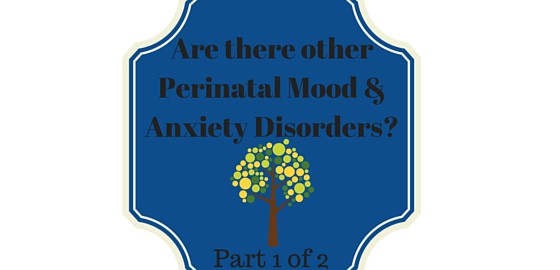You’ve probably heard about depression and anxiety that occur during pregnancy or the postpartum period. You may have even read about them in my previous posts on perinatal mental health. But you may be less familiar with the remaining perinatal mood and anxiety disorders (PMADS). If you or a loved one are experiencing mental health symptoms during pregnancy or in the postpartum period, but they don’t seem to fit your understanding of perinatal depression or anxiety you may want to look into some of the other perinatal mood and anxiety disorders.
What are the other perinatal mood and anxiety disorders?
- Perinatal Obsessive Compulsive Disorder (OCD)
- Perinatal Post-Traumatic Stress Disorder (PTSD)
- Bipoloar Mood Disorders
- Postpartum Psychosis
I will touch briefly on each of these disorders in this two part series and encourage you to visit the Postpartum Support International website or consult with a mental health professional in your area for a more in depth understanding. Part One of this series will focus on Perinatal Obsessive Compulsive Disorder and Perinatal Post-Traumatic Stress Disorder. Bipolar Mood Disorders and Postpartum Psychosis will be addressed in Part Two of the series.
Perinatal Obsessive Compulsive Disorder (OCD)
- Affects 3-5% of new mothers
- Symptoms include obsessions (intrusive thoughts) related to the baby and compulsions (repeated behaviors) that are an attempt to reduce the obsessions. Mothers with Postpartum OCD find their thoughts concerning.
- Mothers with this diagnosis often are very focused on protecting their baby and fear being left alone with their baby.
- The types of obsessions and compulsions that mothers with Postpartum OCD have can look different for different women.
- It can also be confusing because some of the obsessions and compulsions may be misunderstood or minimized as normal new parent behavior. For example, most new mothers take reasonable efforts to ensure that their babies do not get sick. However, a mother who is very fearful that her baby will become ill and cannot stop worrying about this possibility (obsession), so she repeatedly cleans her home in order to make sure there are no germs in the home (compulsions) is likely experiencing Postpartum OCD and not normal new parent behavior.
Perinatal Post-Traumatic Stress Disorder (PTSD)
- Affects 9% of women
- These mothers experienced the delivery of their child or something that occurred during the pregnancy or postpartum period to be traumatic.
- Symptoms include re-experiencing the trauma through intrusive memories, nightmares or flashbacks and avoidance of reminders of the trauma.
- Additionally, mothers who experience Perinatal Post Traumatic Stress Disorder may experience very intense anxiety, difficulty sleeping, irritability and hypervigilence.
Both Perinatal Obsessive Compulsive Disorder and Perinatal Post Traumatic Stress Disorder are treatable with professional help. If you are concerned that you or a loved one are experiencing symptoms of one of the above disorders I encourage you to consult 1-on-1 with a trained mental health professional in order to get the support you need. The Postpartum Support International website can be a great resource for finding support in your area.
Sarah
I am a licensed marriage and family therapist practicing in the Eagan, Minnesota area and enjoy working with parents at all stages of their parenting journey. Please visit my Counseling for Parents page to learn more about the services that I offer.
